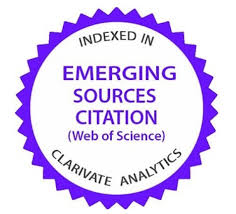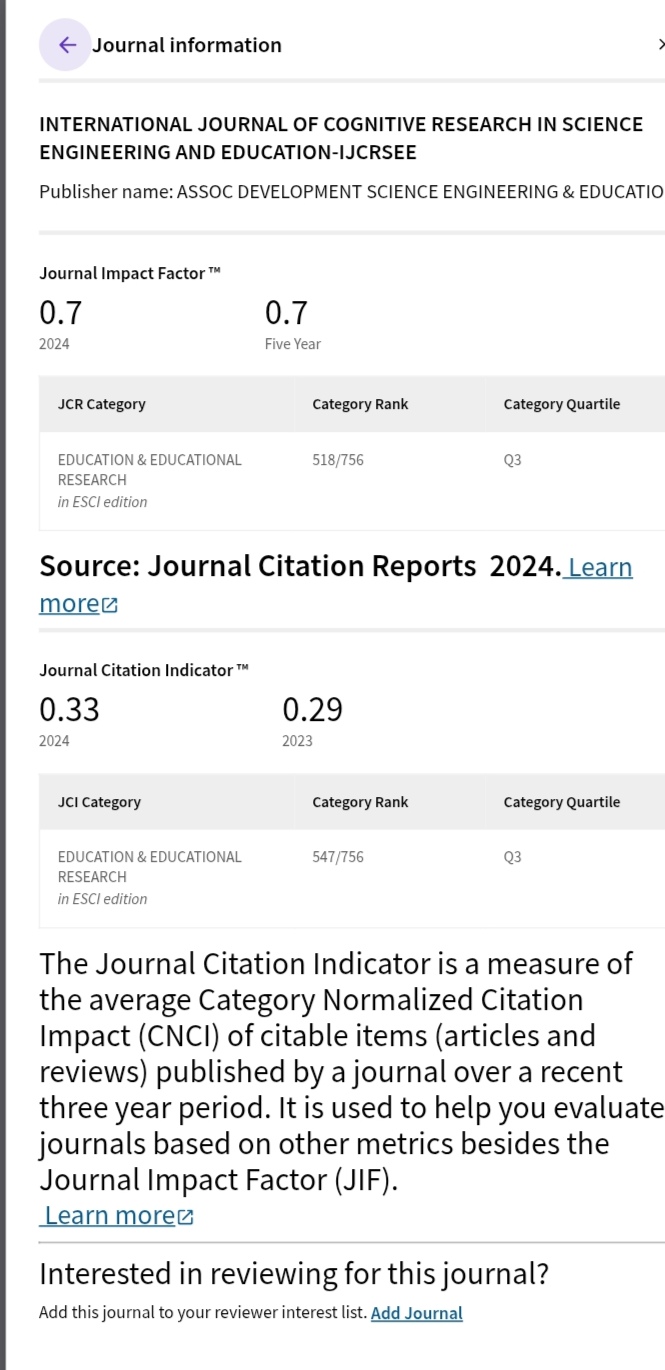Professionalization of The Principal’s Role
DOI:
https://doi.org/10.23947/2334-8496-2021-9-2-241-252Keywords:
professionalization, principals, preschool institutions, professional competences, structural modellingAbstract
The aim of this work is to point out the importance of the professionalization of the principal’s role in education institutions, with an accent on preschool institutions. The sample included principals (N=57) of preschool institutions in Central Croatia. The goal was to test the mediation relationship through SEM and examine the direct influence of interpersonal relationships within the preschool institution on the development of its work quality; furthermore, to test the indirect influence of these relationships by introducing the mediation variable of professional competence. The structured modelling in the AMOS was applied for testing the direct and indirect influence. The contribution of interpersonal relationships on the work quality is high and statistically significant (β=0,920), which confirms the direct influence. For testing the mediation effects, a bootstrapping method was designed that confirmed the indirect influence of interpersonal relationships on the work quality with the statistically significant serial mediator of professional competence (p= 0,016), thereby confirming partial mediation. This research determined that positive interpersonal relations, mediated by the principal’s professional competence, have a positive effect on the work quality of a preschool institution. In order for preschool institutions to reach the desired quality, it is necessary for them to be managed by professionally empowered and expert principals who promote prime cooperative relationships as the starting point in developing a high-quality institution. The results of this research contribute to a clearer perception and understanding of the professionalization of the principal’s role through key areas of his/her work and activity, and the possibility of their practical implementation into education institutions.
Downloads
References
Antulić Majcen, S., & Pribela Hodap, S. (2017). Prvi koraci na putu prema kvaliteti [First steps on the path to quality]. Samovrednovanje ustanova ranog i predškolskog odgoja i obrazovanja. Zagreb: Nacionalni centar za vanjsko vrednovanje obrazovanja. Retrieved from: https://www.bib.irb.hr/915027?rad=915027
Caldwell, B.J. (2005). School-Based Management. Brussels/Paris, The International Academy of Education/UNESCO, The International Institutte for Educational Planning, Education Policy Series, 3.
Dahlberg, G., & Moss, P. (2006). Etchic and Politics in Early Childhood Education. London: Routledge Falmer.
Earley, P., & Greany, T. (2017). School Leadership and Eeducation System Reform. Bloomsbury Publishing. https://doi.org/10.1080/02680939.2019.1696037 DOI: https://doi.org/10.1080/02680939.2019.1696037
Europska komisija (2014). Proposal for key principles of a Quality Framework for Early Childhood Education and Care. Izvješće Radne skupine za rani i predškolski odgoj i obrazovanje pod pokroviteljstvom Europske komisije. Retrieved from: http://ec.europa.eu/assets/eac/education/policy/strategicframework/archive/documents/ececquality-framework_en.pdf (13.1.2019.)
European Council (2009). Council conclusions of 26 November 2009 on the professional development of teachers and school leaders. Official Journal of the European Union. Retrieved from: http://eurlex.europa.eu/LexUriServ/LexUriServ.do?uri=OJ:C:2009:302:0006:0009:EN:PDF. (24.09.2018.)
ETUCE (2008). Teacher education in Europe, Brussels: European trade union committee for education and Comitee syndical europeen de l’education /online/. Retrieved from: http://etuce.homestead.com/Publications2008/ETUCE_PolicyPaper_en_web.pdf (24.09.2019.)
Fullan, M. (1993). Change Forces. London: The Falmer Pres.
Fullan, M. (2011). The Moral Imperative Realized. Thousand Oaks, CA: Corwin Press. https://doi.org/10.1177/13654802110140021002 DOI: https://doi.org/10.1177/13654802110140021002
Gopnik, A., Meltzoff, A. N., Kuhl, P. K., & Jagodić, G. K. (2003). Znanstvenik u kolijevici: što nam rano učenje kazuje o umu. [The scientist in the cradle: what early learning tells us about the mind] Educa.
Grint, K., & Holt, C. (2011). Leading questions: If ‘Total Place’,‘Big Society’and local leadership are the answers: What’s the question?. Leadership, 7(1), 85-98. https://doi.org/10.1177/1742715010393208 DOI: https://doi.org/10.1177/1742715010393208
Hersey, P., Blanchard, K., & Johnson, D. (2008). Management of Organizational Behavior: Leading Human Resources, 9th edn. Upper Saddle River, NJ: Pearson Education.
Jurčević-Lozančić, A. (2011). Teorijski pogledi na razvoj socijalne kompetencije predškolskog djeteta [Theoretical views on the development of social competence of a preschool child]. Pedagogijska istraživanja, 8(2), 271-279. Retrieved from https://hrcak.srce.hr/116661
Kokanović, T. (2021). Profesionalne kompetencije ravnatelja u razvoju kvalitete rada predškolskih ustanova [Professional competencies of principal in the development of quality of preschool institutions]. Doktorska disertacija. Zagreb: Filozofski fakultet Sveučilišta u Zagrebu. Retrieved from https://repozitorij.ffzg.unizg.hr/islandora/object/ffzg:4025
Leithwood, K., & Day, C. (2007). Successful Principal Leadership in Times of Change. Dordrecht, Netherlands: Springer.
Matsumura, L. C., Garnier, H. E., & Resnick, L. B. (2010). Implementing literacy coaching: The role of school social resources. Educational Evaluation and Policy Analysis, 32(2), 249-272. https://doi.org/10.3102/0162373710363743 DOI: https://doi.org/10.3102/0162373710363743
Melhuish, E., Ereky-Stevens, K., Petrogiannis, K., Ariescu, A., Penderi, E., Rentzou, K. & Broekhuisen, M. (2015). A review of research on the effects of early childhood education and care (ECEC) on child development. CARE project; Curriculum Quality Analysis and Impact Review of European Early Childhood Education and Care (ECEC). https://doi.org/10.4324/9780203967676 DOI: https://doi.org/10.4324/9780203967676
Miljak, A. (2009). Življenje djece u vrtiću [Children’s life in kindergarten]. Zagreb: SM naklada..
Mlinarević, V. (2004). Vrtićko okruženje usmjereno na dijete [Child-centered kindergarten environment]. Život i škola, 11(1), 112-119. Retrieved from https://bib.irb.hr/datoteka/183458.Vrtino_okruzenje_usmjereno_na_dijete.pdf
OECD (2005). Teachers Matter (Hungarian version): Attracting, Developing and Retaining Effective Teachers (Summary), OECD Publishing, Paris, https://doi.org/10.1787/9789264018044-sum-hu. DOI: https://doi.org/10.1787/9789264018044-sum-hu
Peterson, K. (2002). Positive or Negative? Journal of Staff Development, 23(3), 5-10.
Rinaldi, C. (2006). In dialogue with Reggio Emilia: Listening, researching and learning. Psychology Press. https://doi.org/10.4324/9780203317730 DOI: https://doi.org/10.4324/9780203317730
Rood, J. (2006). Leadership in Early Chilhood: The Pathway to Professionalism. Buckingham: Open University Press.
Rood, J. (2013). Leadership in Early Childhood: The Pathway to Professionalism. London: Routledge.
Sekulić-Majurec, A. (1997). Integracija kao pretpostavka uspješnije socijalizacije djece i mladeži s teškoćama u razvoju: očekivanja, postignuća, perspektive [Integration as a pre-requisite for more successful socialization of children and youth with developmental difficulties: expectations, achievements, perspectives]. Društvena istraživanja, 6(30+31), 537-550. Retrieved from https://hrcak.srce.hr/31662
Slunjski, E. (2006). Stvaranje predškolskog kurikuluma u vrtiću-organizaciji koja uči [Creating a pre-school curriculum in a kindergarten-learning organization]. Zagreb/Čakovec: Mali profesor/Visoka učiteljska škola. Retrieved from https://www.bib.irb.hr/360924?rad=360924
Slunjski, E. (2008). Dječji vrtić-zajednica koja uči, mjesto dijaloga, suradnje i zajedničkog učenja. [Kindergarten-learning community, a place of dialogue, cooperation and joint learning]. Zagreb: Spektar Media.
Slunjski, E. (2011). Različiti pristupi istraživanju i tvorbi kurikuluma [Different approaches to research and curriculum development]. U: Maleš, D. (ur), Nove paradigme ranoga odgoja [New paradigms of early childhood education]. Zagreb: Filozofski fakultet Sveučilišta u Zagrebu Zavod za pedagogiju, str.179-208.
Slunjski, E. (2018). Izvan okvira 3, Vođenje:prema kulturi promjene. [Outside the Box 3, Leadership: towards a culture of change]. Zagreb: Element.
Snyder, P.A., Denney, M.K., Pasia, C., Rakap, S. i Crowe, C. (2011). Professional development in early childhood intervention: Emerging issues and promising approaches. In Groark, C. and Kaczmarek, L.A. (Eds), Early childhood intervention: Shaping the future for children with special needs and their families, (Vol. 1-3). Santa Barbara, CA: Praeger/ABC-CLIO. Pp. 169-204.
Staničić, S. (2001). Kompetencijski profil ravnatelja [Competence profile of the principal]. U: Staničić, S. (ur.) Školski priručnik 2001./2002. Zagreb: Znamen, str.179-185
Staničić, S. (2006). Menadžment u obrazovanju [Management in education]. Rijeka: Vlastita naklada.
Staničić, S., Kovač, V., Đaković, O. (2016). Standardi za ravnatelje odgojno-obrazovnih ustanova (Izvješće o ostvarenju 1. i 2. zadaće Ekspertne radne skupine za provedbu 5. cilja Strategije obrazovanja, znanosti i tehnologije – ERS-e5) [Standards for principal”s of educational institutions (Report on the realization of tasks 1 and 2 of the Expert Working Group for the implementation of Objective 5 of the Strategy of Education, Science and Technology - ERS-e5)]. Zagreb: Nacionalni centar za vanjsko vrednovanje obrazovanja. https://doi.org/10.21861/hgg.2011.73.01.18 DOI: https://doi.org/10.21861/HGG.2011.73.01.18
Strategija obrazovanja znanosti i tehnologije [Science and Technology Education Strategy]. (2014). Narodne novine, br. 124/2014. Retrieved from https://mzo.gov.hr/UserDocsImages/dokumenti/Obrazovanje/Strategija%20obrazovanja,%20znanosti%20i%20tehnologije.pdf
Vandenbroeck, M. et al. (2017). Benefits of early childhood education and care and the conditions for obtaining them, Izvješće Europske stručne skupine za ekonomiju obrazovanja. Retrieved from: http://www.eenee.de/eeneeHome/EENEE/Analytical-Reports.html (12.1.2019.)
Vujičić, L. (2011). Istraživanje kulture odgojno-obrazovne ustanove [Research of the culture of an educational institution]. Zagreb: Mali profesor. Retrieved from: https://www.bib.irb.hr/530858?rad=530858
Vujičić, L., & Tambolaš, A. Č. (2017). Profesionalni razvoj odgajatelja- izazov za pedagoga [The professional development of educators – a challenge for pedagogues]. U: Turk, M. (ur.), Suvremeni izazovi u radu (školskog) pedagoga - Zbornik u čast Stjepana Staničića, Rijeka: Filozofski fakultet Rijeka, str.132-156. https://doi.org/10.19090/zop.2017.26.7-29 DOI: https://doi.org/10.19090/zop.2017.26.7-29
Published
How to Cite
Issue
Section
Categories
License
Copyright (c) 2021 Tihana Kokanović, Siniša Opić

This work is licensed under a Creative Commons Attribution 4.0 International License.
Plaudit
Accepted 2021-05-10
Published 2021-08-31












